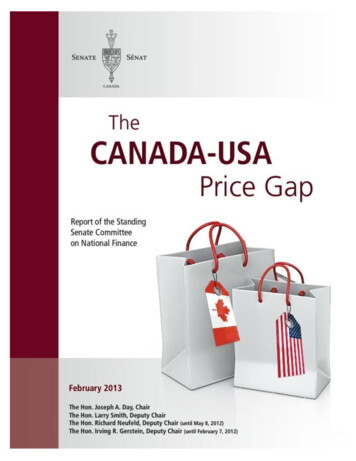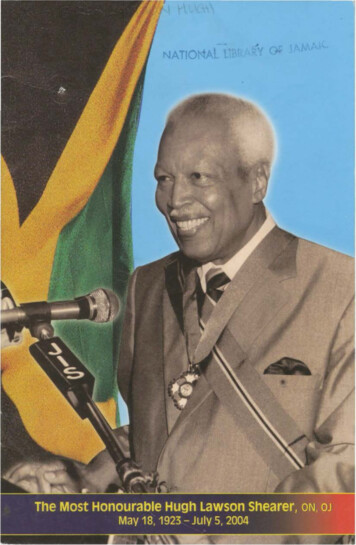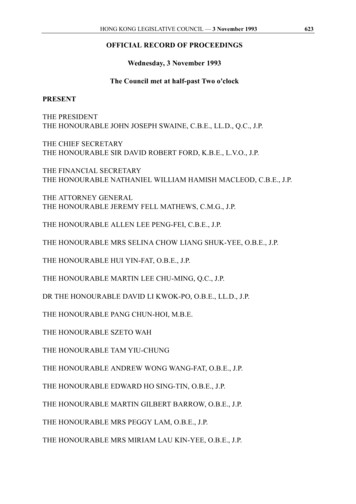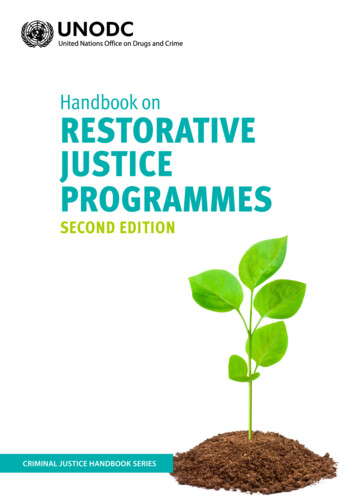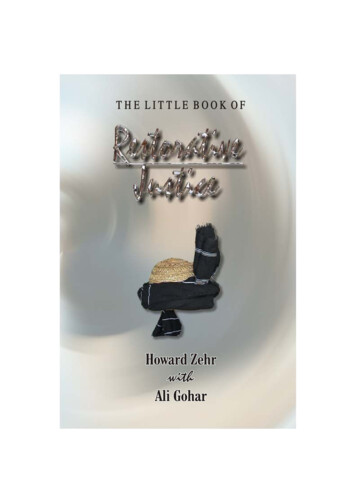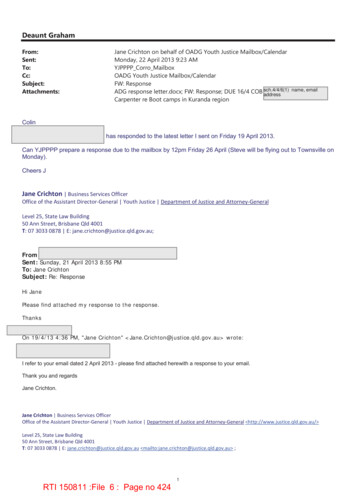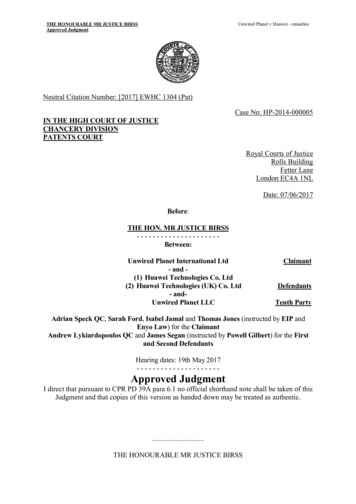
Transcription
Unwired Planet v Huawei - remediesTHE HONOURABLE MR JUSTICE BIRSSApproved JudgmentNeutral Citation Number: [2017] EWHC 1304 (Pat)Case No: HP-2014-000005IN THE HIGH COURT OF JUSTICECHANCERY DIVISIONPATENTS COURTRoyal Courts of JusticeRolls BuildingFetter LaneLondon EC4A 1NLDate: 07/06/2017Before:THE HON. MR JUSTICE BIRSS--------------------Between:Unwired Planet International Ltd- and (1) Huawei Technologies Co. Ltd(2) Huawei Technologies (UK) Co. Ltd- andUnwired Planet LLCClaimantDefendantsTenth PartyAdrian Speck QC, Sarah Ford, Isabel Jamal and Thomas Jones (instructed by EIP andEnyo Law) for the ClaimantAndrew Lykiardopoulos QC and James Segan (instructed by Powell Gilbert) for the Firstand Second DefendantsHearing dates: 19th May 2017---------------------Approved JudgmentI direct that pursuant to CPR PD 39A para 6.1 no official shorthand note shall be taken of thisJudgment and that copies of this version as handed down may be treated as authentic.THE HONOURABLE MR JUSTICE BIRSS
THE HONOURABLE MR JUSTICE BIRSSApproved JudgmentUnwired Planet v Huawei - remediesMr Justice Birss :1.This judgment deals with the remedies to follow from my main judgment dated 5thApril 2017 ([2017] EWHC 705 (Pat)). There is no need to rehearse the background.The first issue I have to decide is what sort of relief should be granted in this case.Unwired Planet press for a final injunction to restrain infringement of the two patentsfound to be valid and infringed, albeit they also accept that the injunction should bestayed on terms pending any appeal by Huawei to the Court of Appeal. Huaweicontend that I should accept certain undertakings from Huawei and not grant a finalinjunction. This first issue is the major question I have to decide. The other issuesare: second what to do about damages, third a point on certain declaratory relief,fourth costs, and fifth permission to appeal.The first issue – injunction or undertakings2.The main judgment decided that a particular form of licence represents the FRANDterms between the two relevant parties, Unwired Planet and Huawei, in the relevantcircumstances. That licence will be referred to as the Settled Licence. It is annexedto this judgment. The form of the Settled Licence was finalised a few weeks after themain judgment. There is no dispute that the Settled Licence in that form reflects thedecisions made in the main judgment.3.The Settled Licence is a global licence. Throughout the proceedings Huawei hadmaintained that they were not prepared to enter into a global licence with UnwiredPlanet. Huawei had made it clear that they did not accept that a global licence wasFRAND as a matter of competition law. This was reflected in the main judgment, forexample paragraphs 524-572. I held that such a licence was FRAND and that sinceUnwired Planet had established infringement by Huawei of valid patents and sinceHuawei have not been prepared to take the FRAND licence, a final injunction shouldbe granted (paragraphs 793-795 and the summary paragraph 806(18)).4.I had made it as clear as I could to the parties during trial that the trial itself was thehearing at which the question of whether or not to grant an injunction was to bedecided. However because Huawei had refused to engage with the terms of aworldwide licence, the fully worked out Settled Licence did not exist at the date thejudgment was handed down. Reluctantly I decided that the injunction could not bedealt with at the handing down but would be dealt with at a later hearing (see mainjudgment paragraph 794). Although Huawei were to that extent benefitting from theirearlier non-engagement, nevertheless that seemed to me to be the proper course.5.A preliminary question is whether there is anything to decide at all. Huawei submitthat I have not actually made the decision whether to grant a final injunction or not.However in case they are wrong Huawei have also issued an application to reconsiderthe grant or refusal of a final injunction under the jurisdiction confirmed by theSupreme Court in Re L-B [2013] 1 WLR 634. Unwired Planet pointed out that in themain judgment I said an injunction “should be granted” (see summary paragraph807(18)) but Unwired Planet did not press a formal point that the issue could not beconsidered on its merits at this hearing.6.Since no injunction was granted when the main judgment was handed down and sinceI stated in terms that I would deal with an injunction at a later hearing, I have not yet
THE HONOURABLE MR JUSTICE BIRSSApproved JudgmentUnwired Planet v Huawei - remediesexercised the court’s power one way or another on this issue. It is open to me todecide the matter and there is no need to consider exercising the Re L-B jurisdiction.7.Unwired Planet contend that a final injunction should be granted. They agree that itshould be stayed on terms pending appeal, but that is all.8.Huawei submit that the present circumstances are now materially different from thecircumstances during trial and at the time the judgment was handed down. NowHuawei offer two undertakings to the court. They are set out in the witness statementof Huawei’s UK solicitor Simon Ayrton of Powell Gilbert. He explains that pendingappeal Huawei are prepared to provide the following undertakings to the Court:“First, that within seven days of the expiry of the time to appealagainst the Final Order or, if there is an appeal against the FinalOrder, its withdrawal or final determination, Huawei will enterinto the form of licence settled by Mr Justice Birss (i.e. theLicence) or such other licence as may be finally settled by thecourts.Second, that until the expiry of the time to appeal against theFinal Order or, if there is an appeal against the Final Order,pending its withdrawal or final determination, Huawei willabide by the terms of the Licence as if the same were in fullforce and effect.”9.The “Final Order” is the order whose terms I am deciding now. The “Licence” iswhat I have called the Settled Licence.10.Huawei submit that I should accept this undertaking and refuse to grant a finalinjunction. They submit that Unwired Planet are protected pending appeal becauseHuawei will pay royalties in the meantime (subject to a point about a letter of credit todeal with what happens if Huawei win their appeal). They also submit that the effectof this undertaking is that one way or another there will be a licence in place withHuawei as a party. Mr Ayrton says that these undertakings mean that Huawei arewilling to enter into whatever licence the UK courts settle and in the meantime willabide by the Settled Licence as if it is in force. If no other licence is finally settled bythe courts then Huawei will enter into the Settled Licence. So the final injunction willserve no useful purpose for the duration of the Settled Licence or such other licence asis finally settled by the courts. Mr Ayrton then points out that the Settled Licence willexpire in 2020 (and a 2020 expiry was an agreed term of the UK licence at trial).Since patent EP (UK) 2 229 744 which was considered in trial A and found valid andinfringed does not expire until 2028, the injunction will still be in being in 2020 whenthe Settled Licence expires. Having the injunction in place at that time would unfairlydistort the positions of the parties in any renegotiation which would need to takeplace.11.Unwired Planet take a number of points in response to these submissions. Their firstmajor argument is that Huawei’s submissions mix together the question of what thefinal relief should be absent any appeal, with the question of what the terms should bepending appeal. They contend that, subject to an issue about letters of credit, there isno dispute about the appropriate terms pending any appeal. Huawei in effect should
THE HONOURABLE MR JUSTICE BIRSSApproved JudgmentUnwired Planet v Huawei - remediesbehave as if the Settled Licence is in force and pay royalties in the meantime, subjectto repayment by Unwired Planet. But the fact that the final injunction should bestayed pending appeal does not mean it should not be granted. They argue that todaythe position remains that Huawei refuse to enter into the licence found to be FRANDby the court and so an injunction ought to be granted. They argue that what Huaweiare trying to do is decline to enter into the licence settled by the court at least whilethe appeal is pending but still avoid an injunction. They say this builds an interimmeasure into what should be final relief.12.Unwired Planet’s second point is to dispute Huawei’s assertion that the effect of theundertakings is that it is inevitable that Huawei will enter into a licence with UnwiredPlanet at the conclusion of the appeal process. Unwired Planet do not agree that theundertakings offered make it watertight, in every conceivable scenario on appeal, thata licence will be in force between Unwired Planet and Huawei at the end. Thatdepends on examining the points on which Huawei wish to appeal, which I will returnto below.13.Like many aspects of this case, this dispute about relief raises some new problems.One suggestion was that the real problem was that the Settled Licence had no termsdealing with appeals. Huawei submitted that if it did then they might be able to enterinto it now but still argue on appeal that a UK licence was the right outcome. I agreethat it might be possible to craft terms in a licence which could allow for somethinglike that and perhaps the next time a court is called upon to settle FRAND terms, thatcould be considered. But neither side suggested such terms at trial and I made it clearthe time to do that was then, not now (e.g. paragraph 581). Moreover I am notconvinced it is as simple as Huawei suggest.14.Another point is the issue of what happens in 2020. This arises from the fact that theeight year term of the Settled Licence runs from 2013 until 2020. That term arosebecause the parties at trial were agreed that the UK licence should work that way.When I came to consider the worldwide licence I started from the UK terms, finding(paragraph 593) that the points the parties were able to agree upon as FRAND in theUK licence were just as applicable to a worldwide licence. That included recognisingthat it would be an eight year licence running from expiry of the 2009 EricssonHuawei licence until the end of 2020.15.When, during the trial, I saw the agreed expiry date of 31st December 2020 in the UKlicence my first reaction was one of surprise. It was only three years away and at leastsome of the patents will last much longer than that. But on reflection I could see thatsuch a thing made sense and I was not surprised the parties had agreed on it. One ofthe real problems with FRAND and SEPs is that all sorts of relevant circumstanceschange. Old patents expire and new ones are granted. Standards themselves change.One might think new patents cannot be essential to old standards but even that is notas simple as it might appear. Fixing a rate for a period of years involves a risk(paragraph 563) and so the idea that today one can agree what the rate should be formany years into the future is difficult. If patents courts are to support orderly FRANDlicensing of standards essential patents, as I believe they should, then a workableapproach needs to be developed which allows for these changing circumstances.
THE HONOURABLE MR JUSTICE BIRSSApproved JudgmentUnwired Planet v Huawei - remedies16.Huawei are right to raise this problem. It is inherent in settling licences in this field.It would have arisen just the same if Huawei had won on the UK/worldwide issue. Ithas to be sorted out whoever is correct about the final form of relief.17.In order to decide what to do I believe it is useful to look at what the final remedyshould be absent any appeal and then consider the position pending appeal separately.I note that in Kirin-Amgen v Transkaryotic Therapies Inc (No 3) [2005] FSR 41(decided in 2001 but reported in 2005) Neuberger J (as he then was) took a similarapproach when he was considering the terms of a final patent injunction and the termsof a stay pending appeal. In paragraphs 20 and 21 the judge considered what thecorrect order would be “absent TKT’s appeal”.18.I will start by looking at what the right final relief should be in a patent case with aFRAND licence absent any appeal. Thinking about the problem of what happens in2020 highlights an aspect of Unwired Planet’s case which goes too far. UnwiredPlanet contend that, absent any appeal, the patentee is entitled to a final injunctionwhich should run from now until the expiry of the relevant patents and shouldcontinue even if the defendant enters into a licence. They argue that such aninjunction will not prejudice Huawei, even if Huawei become licensed, because theprohibition is only to not infringe. Therefore, they say, if Huawei have a licence, thentheir relevant acts are not infringements and not prohibited by the injunction.19.In my judgment this approach is unreal. By that logic if I granted the injunction todayand Huawei signed the Settled Licence tomorrow the injunction would remain inexistence. What happens if a year later a dispute arises about an alleged repudiatorybreach of the licence? Huawei could then be in an impossible position because theywould risk being in contempt of court if they continued to sell equipment during aperiod when there was an argument that the licence had come to an end.20.With this problem in mind and assuming an injunction should be granted at all I willconsider, absent appeal, what the correct form of a final injunction in respect ofpatents the subject of a FRAND undertaking should be when the court has settled aFRAND licence but the defendant has not entered into it. I will call this a FRANDinjunction. The answer is simple. A FRAND injunction should be in normal form torestrain infringement of the relevant patent(s) but ought to include a proviso that itwill cease to have effect if the defendant enters into that FRAND licence. If as in thiscase, the FRAND licence is for a limited time, shorter than the lifetime of the relevantpatents then the injunction should also be subject to an express liberty to either partyto return to court in future to address the position at the end of the term of the FRANDlicence. In any case the FRAND injunction should also be subject to an expressliberty to apply in the event the FRAND licence ceases to have effect for any otherreason.21.Normally in English law when the court grants final relief a party is not entitled tocome back to court in future even if circumstances change but these unusual termsarise from dealing with patents the subject of a FRAND undertaking. A FRANDinjunction in this form reflects the finding that what the patentee is entitled to today,bearing in mind its FRAND undertaking, is a licence on FRAND terms but if thedefendant has the ability to take the licence and does not do so, then an injunction isappropriate for as long as the defendant does not enter into that licence. If thedefendant enters into the FRAND licence there should be no injunction at all. The
THE HONOURABLE MR JUSTICE BIRSSApproved JudgmentUnwired Planet v Huawei - remediesfact the FRAND licence is limited in time does not justify an injunction continuinginto the future. The court should not pre-judge at this stage what should happen if orwhen the FRAND licence ceases to have effect.22.In this case the FRAND licence is the Settled Licence. It will expire on 31stDecember 2020. Thinking about the position on 1st January 2021 at this stage now in2017, it cannot be said that Unwired Planet must have an injunction on that futuredate but neither can it be said today that Huawei must be free to sell products orcommit any other act on that future date which would infringe if unlicensed. Theanswer to those questions depends on the circumstances at that time. At times inargument before me it seemed to be contemplated that the process of resolving what isto happen after the end of the Settled Licence only has to start on 1st January 2021.That is wrong. If the patentee has failed to start a process of FRAND negotiation wellin advance of the expiry of the current FRAND licence then no doubt the court will beunsympathetic to the patentee even if no licence has been finalised to start the dayafter expiry. So too if the patentee has dragged its feet in the negotiation. Converselyif the patentee engages reasonably but the putative licensee does not, then the court’ssympathies may well lie the other way round.23.To deal with an appeal the FRAND injunction in the form described can simply bestayed pending appeal on terms to secure appropriate payments in the meantime.24.I turn to consider whether a FRAND injunction should be granted or whether I shouldaccept the undertakings offered by Huawei instead.25.The grant or refusal of an injunction is an exercise of the court’s discretion. Thatdiscretion is circumscribed in various ways. Nevertheless when the holder of anintellectual property right has established infringement and a threat and intention toinfringe in future, an injunction will normally be granted. In the words of Art 3 of theDirective on the Enforcement of Intellectual Property Rights (2004/48/EC) aninjunction in those circumstances is normally effective, proportionate and dissuasive.26.It is not unusual in intellectual property cases for the defendant, having defended theclaim vigorously throughout, to turn round after the judgment has been given againstit and seek to offer undertakings not to infringe in order to avoid being subject to aninjunction. Rights holders generally resist this course and insist on an injunction. Inpart that is because it involves a public vindication of their rights. Indeed that isexactly what the defendant is usually seeking to avoid by its belated offer ofundertakings not to infringe. The practical effect of the two things (injunction andundertaking) is the same, and actually undertakings can be rather easier to enforceunder English civil procedure, but nevertheless rights holders usually insist on aninjunction for the reason I have explained. The claimant has been forced to come tocourt and vindicate its claim. An offer of undertakings after judgment is usuallyregarded as made too late. In general the courts will order the injunction and refuse toaccept such belated undertakings.27.Turning to this case, in my judgment it is not irrelevant that the undertaking offeredby Huawei is only offered now, after many years of litigation and after judgment hasbeen handed down. If, from the outset, Huawei had given an unqualified undertakingto enter into whatever licence the court (including an appellate court) had decided wasFRAND, then an injunction at this stage would not have been appropriate. Indeed
THE HONOURABLE MR JUSTICE BIRSSApproved JudgmentUnwired Planet v Huawei - remediesHuawei argued that the terms of the qualification on the claim for an injunctionsought by Unwired Planet from the beginning (main judgment paragraph 679-683)run counter to such an injunction. That would have been a better point if Huawei hadoffered this undertaking at an earlier stage. It is also notable that Huawei argued, andI accepted, that the qualification was ineffective.28.On the other hand the patentee’s FRAND undertaking does make this situation verydifferent from a normal IP case. The question is whether, given the FRANDundertaking, even a very belated undertaking to take whatever FRAND licence thecourt settles should mean that the court should refuse a FRAND injunction in theappropriate form. The possibility of an appeal has nothing to do with it becauseHuawei’s ability to appeal is and can be protected whichever approach I take.29.Huawei contend that absent an appeal they would sign the Settled Licence now. I donot doubt that but it is no different from the position of any defendant who changestheir tune after they have lost a case. Throughout these proceedings Huawei havemaintained a determined stance that they would not accept a worldwide licence in thisway. It has been a fundamental issue. In my judgment the undertaking offered byHuawei now is too late. By refusing to offer an unqualified undertaking before trialand before judgment Huawei forced Unwired Planet to come to court and vindicate itsrights. The right thing to do now is grant a FRAND injunction albeit one which willbe stayed on terms pending appeal.30.I have reached this conclusion without considering Unwired Planet’s submission thatthe undertakings in the form offered by Huawei are not watertight. My initial view –from looking at the words of the undertakings themselves and in particular the firstundertaking - was that they were watertight. In other words that it was legallyinevitable that whatever happened on appeal Huawei would end up being a party to alicence covering at least the United Kingdom. However what emerged during thecourse of argument is that one cannot assess the effect of these undertakings withoutalso taking into account the points Huawei wish to argue on appeal. They areaddressed below. At this stage all I will say is that it seems to me that a conceivableresult of the points Huawei wish to argue and which I am satisfied have a realprospect of success is that an appellate court could decide that the court cannot settlethe terms of a licence. If that happened then on the face of the wording theundertakings do not oblige Huawei to enter into any licence. Huawei say that thatoutcome on appeal is not their case. Rather their case is that the licence should be aUK only licence. I accept that the outcome I have described is not the outcome of theprimary case Huawei contends for, but it is a possible consequence of the argumentsHuawei advance. It could arise if Huawei are correct that there is more than one setof terms which are FRAND and possibly in other circumstances too. For this reasonalso I prefer to grant a FRAND injunction stayed pending appeal rather than acceptthe undertakings offered.31.A point arose on the letter of credit which Unwired Planet have offered to deal withrepayment of any sums paid in the interim pending appeal. Unwired Planet proposeda letter of credit drawn on a bank called Pegasus Bank in Dallas. Huawei contend thatthe bank should be one in the UK. Unwired Planet say that to achieve that will causevery substantial and unjustified extra cost. Huawei’s representatives explained thatthey are not aware of Pegasus Bank and should not be compelled to accept a letter ofcredit from it. The fair approach is to require Unwired Planet to give a bank
THE HONOURABLE MR JUSTICE BIRSSApproved JudgmentUnwired Planet v Huawei - remediesguarantee to Huawei’s satisfaction. If that comes at a cost then those costs should berecoverable from Huawei if no repayment is made to Huawei, but borne by UnwiredPlanet if any sum is repaid.32.Counsel for Huawei raised a concern that the draft order provided by Unwired Planetincludes a penal notice. In the circumstances that is inflammatory and unnecessary.It is only necessary to serve an order with a penal notice if it is to be enforced underCPR r81.4. Since on any view the injunction will only bite after an appeal, UnwiredPlanet can always serve a further copy of the order, endorsed with a penal noticeunder CPR r81.9, in future if they feel it is necessary. There is no reason why theorder should contain one now.The second issue – damages33.This is closely related to the first issue. The point is that if Huawei enter into theSettled Licence then no problem about damages for past acts arises because they arecovered in that agreement. But as of now Huawei have not entered into the SettledLicence. Absent appeal if Huawei never did enter into the Settled Licence thendamages will be due and an order for damages should be made. The order should bein the same form as the FRAND injunction, i.e. that it will cease to have effect if thedefendant enters into the Settled Licence. The way to deal with appeals is to stay thematter pending appeal.The third issue – declaratory relief34.It is common ground that some declarations should be made. Two are agreed, onethat Unwired Planet’s various offers are not FRAND and the other that Huawei’soffers were not FRAND. It is also common ground that some sort of declarationshould be made about the Settled Licence but there is a dispute about the terms. Thedrafts assume the licence is annexed to the order but I will annex it to this judgmentinstead. Making allowance for that trivial change (in italics), the parties rivaldeclarations arei)Unwired Planet:“the terms of the licence annexed to the judgment are FRAND”ii)Huawei:“(1) Neither a licence only to the Patents nor a licence only to UnwiredPlanet’s entire UK SEP Portfolio is FRAND(2) The only FRAND terms of a licence of Unwired Planet’s StandardEssential Patents to Huawei are those set out in the licence annexed to thejudgment”35.Huawei’s point is that Unwired Planet’s formulation does not capture the finding thatonly one set of terms are FRAND in a given set of circumstances. Huawei’s versionaims to do that. Unwired Planet resist Huawei’s drafts as tautologous and undulycomplicated. They argue that the first negative declaration is redundant in the light ofthe second positive declaration and submit that the real purpose of this wording is to
THE HONOURABLE MR JUSTICE BIRSSApproved JudgmentUnwired Planet v Huawei - remediesgive Huawei something to appeal against when the effect of the appeal wouldotherwise be academic.36.I agree that a declaration about the status of the Settled Licence ought to be made.However the declarations proposed by Huawei are too complicated and I am notconvinced there is any good reason to take that approach. The declaration will be:“the licence annexed to the judgment represents the FRAND terms applicablebetween the parties in the relevant circumstances” .37.That seems to me to adequately capture the conclusion reached in the main judgment.38.Finally Huawei also seek a declaration that Unwired Planet had not abused itsdominant position. The purpose of this was, I think, to create a reason for appealingthe Huawei v ZTE point and arguing that no injunction was appropriate even ifHuawei’s undertakings had been accepted and no injunction granted. Whether thatwas a kind of bootstrap argument is not something I have to decide since I havegranted an injunction. Since the judgment makes a clear finding that Unwired Planethas not abused its dominant position and states as much in summary paragraph807(17), there is no need for that declaration and I will refuse it.The fourth issue – costs39.Unwired Planet argue that they should be regarded as the successful party (followingRoach v Newsgroup Newspapers [1998] EMLR 161 and other cases) and thereforethe order relating to costs should be that Huawei pays Unwired Planet’s costs of theseproceedings subject to some issues which Unwired Planet accept they cannot recover.The issues to be excluded are the claims against Google and Samsung and theallegation that the MSA was void under Art 101 TFEU. Although Huawei adoptedpart of Samsung’s Art 101 case, it is convenient to refer to all these excluded issues asthe Samsung issues.40.Unwired Planet’s actual costs of the non-technical trial are about 12.4 million.Huawei’s costs were about 7 million. Unwired Planet seek a payment on accountfrom Huawei of about 6.4 million which is arrived at in the following way. Thestarting point is a costs’ estimate confirmed in July 2016. At that stage UnwiredPlanet estimated their total costs to the end of the proceedings would be about 8.5million. Huawei queried how a total of 12.4 million could have been incurred by theend of the non-technical trial (the hearing ended in December 2016) given thatestimate. It emerged that at least part of the explanation was that the estimate wasseriously in error. Nevertheless realistically Unwired Planet accepted that as astarting point to calculate a payment on account the July estimate should be taken.Starting from 8.5 million Unwired Planet deduct 24% for the Samsung issues. Thatcomes to 6.4 million. If, contrary to their case a deduction should be made for thecosts of the FRAND rate, those costs represent 43% of Unwired Planet’s costs. Sothe payment on account should be 57% of 6.4 million which is 3.6 million.41.Huawei contend that the correct order for costs is no order. In other words each sidebears its own costs. They argue that this was an unusual trial and it is not realistic toidentify a single overall winner. There were three major issues: (i) worldwide vs UKlicence; (ii) the FRAND rate and (iii) Article 102 TFEU. Although Unwired Planet
THE HONOURABLE MR JUSTICE BIRSSApproved JudgmentUnwired Planet v Huawei - remedieswon on the first and third issue, Huawei submit that Huawei won the rate issue or atthe very least it cannot be said that Unwired Planet won that issue. If Huawei can beregarded as the winner of the FRAND rate issue then the fair order is no order as tocosts. Analytically that result could be arrived at either on the basis that there is nooverall winner or on the basis that even if Unwired Planet were the overall winner, thecorrect way to reflect Huawei’s success on the FRAND rate, given that it representedbroadly 40-50% of the costs, would be to make no order. The latter approach wouldnotionally set off Huawei’s costs of the FRAND rate against Unwired Planet’s costson issues (i) and (iii) and taking into account the irrecoverable Samsung issues. If “noorder” is not accepted, the best for Unwired Planet ought to be that they recover thecosts for issues (i) and (iii) but not issue (ii).42.As regards any payment on account, if a payment were to be ordered Huawei contendthat the right starting point is the July 2016 estimate ( 8.5 million) however thededuction of irrecoverable Samsung issues should be larger than 24%, after all w
Unwired Planet International Ltd Claimant-and - (1)Huawei Technologies Co. Ltd (2)Huawei Technologies (UK) Co. Ltd-and-Defendants Unwired Planet LLC Tenth Party Adrian Speck QC, Sarah Ford, Isabel Jamaland Thomas Jones(instructed byEIP and Enyo Law) for theClaimant Andrew Lykiardopoulos QCand James Segan(instructed by Powell Gilbert) for the First
